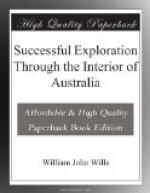. . .
That day he abandoned the depot at ten A.M. leaving 50 pounds of flour, taking with him 150 pounds; leaving 50 pounds of oatmeal, taking about 70 pounds; leaving 50 pounds of sugar, taking 75 pounds; leaving rice 30 pounds, taking one bag. He left neither tea nor biscuits, and took all the clothes, being the property of Mr. Wills. The latter, he said before the Royal Commissioners, were only shirts, omitting the word flannel, and added that they were badly off themselves. He was asked:—
Question 323: Had you any clothes of any description at Cooper’s Creek that might have been left?—Yes, I had a parcel of clothes that were left with me by Mr. Wills; these were all that I know of, and we ourselves were very badly off.
Question 1729. By Dr. Wills (through the chairman)—I wish to know whether a portmanteau was left with you, belonging to Mr. Wills, my son? Yes, a bag, a calico bag containing clothes.
1730.—You were aware it was his own property?—I was.
1731.—What made you take those clothes back to Menindie, and not leave them in the cache?—Mr. Wills was better supplied than any other member of the party, and I certainly did not think he would be in want of clothes.
. . .
With a somewhat unaccountable disposition to sympathize with Brahe, on the part of the Committee and the Royal Commission, the latter summed up their impression of his conduct thus:
The conduct of Mr. Brahe in retiring from his position at the depot before he was rejoined by his commander, or relieved from the Darling, may be deserving of considerable censure; but we are of opinion that a responsibility far beyond his expectations devolved upon him; and it must be borne in mind that, with the assurance of his leader, and his own conviction that he might each day expect to be relieved by Mr. Wright, he still held his post for four months and five days; and that only when pressed by the appeals of a comrade sickening even to death, as was subsequently proved, his powers of endurance gave way, and he retired from the position which could alone afford succour to the weary explorers should they return by that route. His decision was most unfortunate; but we believe he acted from a conscientious desire to discharge his duty, and we are confident that the painful reflection that twenty-four hours’ further perseverance would have made him the rescuer of the explorers, and gained for himself the praise and approbation of all, must be of itself an agonizing thought, without the addition of censure he might feel himself undeserving of.
CHAPTER 11.
Proceedings in Melbourne.
Meeting of the Exploration Committee.
Tardy Resolutions.
Departure of Mr. Howitt.
Patriotic Effort of Mr. Orkney.
South Australian Expedition under Mr. McKinlay.
News of White Men and Camels having been seen by Natives
in the Interior.
Certain Intelligence of the Fate of the Explorers
reaches Melbourne.




